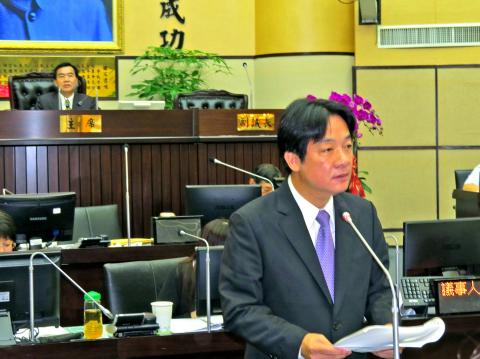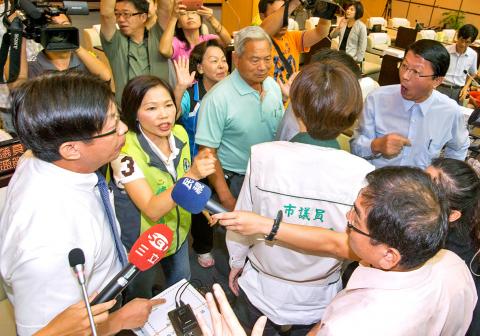After a nearly eight-month-long boycott, Tainan Mayor William Lai (賴清德) yesterday delivered a policy address at the Tainan City Council as the city grapples with an outbreak of dengue fever that has infected more than 2,500 people and killed four this year.
In an unexpected move, Lai, accompanied by his top administration officials, attended the second regular council session, putting an end to his 234-day boycott of council meetings sparked by accusations of vote-buying against Tainan Council Speaker Lee Chuan-chiao (李全教) of the Chinese Nationalist Party (KMT).
Lai was greeted by several Democratic Progressive Party (DPP) councilors waiting for him at the front entrance, who chanted: “Go, mayor.”

Photo: Tsai Wen-chu, Taipei Times
“Insisting on pushing for reforms and safeguarding Taiwan have always been an unshakable belief of mine since I took off my doctor’s robe and entered politics. I believe a nation can only continue to move forward through repeated reforms,” Lai told an impromptu press conference.
Lai said that in the face of the graft cases involving Lee, which have devastated Tainan’s spirit of democracy, he felt that as the mayor of the city, he was obligated to shoulder the responsibility of defending the city’s dignity and thus chose to stake his political career on his Jan. 6 decision not to attend any city council meetings until the investigation into the council speaker election yielded conclusive results.
While a verdict on Lee’s case might not be forthcoming in the foreseeable future because of his repeated attempts to use “underhanded” means to recuse judges, the city has seen a glimmer of hope for clean politics in light of the severe sentences handed out to the speaker’s campaign director and vote brokers, Lai said.

Photo: CNA
“Accordingly, I choose today [yesterday] to enter the council and deliver my policy report,” the mayor said, adding that the decision did not mean an end to his administration’s efforts to promote reforms or equate it with him succumbing to vicious powers.
“It signifies the beginning of a new stage. Let us keep on pushing reforms until we succeed,” Lai said.
Lee’s top aide, Huang Teng-ching (黃澄清), was found guilty of vote-buying in last year’s nine-in-one elections and sentenced to five years in prison by the Tainan District Court on July 31.
Two other people believed to be the council speaker’s vote brokers, Lee Li-hua (李麗華) and Kang Ching-liang (康清良), were also found guilty and given suspended two-year and 19-month sentences respectively.
Asked to describe his mood after sitting on the mayoral chair in the council, Lai said he would handle everything with equanimity.
The DPP mayor had suffered several setbacks in what he called his endeavors to ensure a clean city council. He was impeached by the Control Yuan with a 7-to-2 vote on Aug. 4 for “gross negligence” for not fulfilling his duty to attend question-and-answer sessions at the council.
He was referred to the Public Functionary Disciplinary Sanction Commission for disciplinary action, which could include revocation of his mayorship.
Separately yesterday, DPP spokesman Juan Chao-hsiung (阮昭雄) issued a statement recognizing Lai’s endeavors in fighting “black gold politics,” which he said was the responsibility of the entire society and required long-term efforts and systematic reforms.
“The DPP will not leave Mayor Lai fighting the battle alone. We plan to list amendments to the Local Government Act (地方制度法) as a priority bill in the next legislative session to avoid a second Lee Chuan-chiao,” Juan said in the statement.
Juan also expressed regret over delays in handling the corruption cases against Lee Chuan-chiao, calling on judicial agencies to expedite the process to preserve democracy.
However, KMT Legislator Lin Te-fu (林德福) said that Lai was clearly forced into the council by “mosquitoes.”
“Lai is apparently at his wits’ end in the face of the city’s dengue fever outbreak, which has spiraled out of control. More ridiculous is that his deputy, Yen Chun-tso (顏純左), even tried to reassure the public by saying that only one in 8,000 deaths nationwide last year was caused by dengue fever,” Lin said.
KMT Legislator Wu Yu-sheng (吳育昇) said the fact that Lai only attended council meetings after people died because of dengue fever indicated that the excuses he had used for not going did not stand.
“It also proves that the Control Yuan’s impeachment of Lai was a right call,” Wu said, urging Lai to apologize for his past conduct.

PREPAREDNESS: Given the difficulty of importing ammunition during wartime, the Ministry of National Defense said it would prioritize ‘coproduction’ partnerships A newly formed unit of the Marine Corps tasked with land-based security operations has recently replaced its aging, domestically produced rifles with more advanced, US-made M4A1 rifles, a source said yesterday. The unnamed source familiar with the matter said the First Security Battalion of the Marine Corps’ Air Defense and Base Guard Group has replaced its older T65K2 rifles, which have been in service since the late 1980s, with the newly received M4A1s. The source did not say exactly when the upgrade took place or how many M4A1s were issued to the battalion. The confirmation came after Chinese-language media reported

The Taiwanese passport ranked 33rd in a global listing of passports by convenience this month, rising three places from last month’s ranking, but matching its position in January last year. The Henley Passport Index, an international ranking of passports by the number of designations its holder can travel to without a visa, showed that the Taiwan passport enables holders to travel to 139 countries and territories without a visa. Singapore’s passport was ranked the most powerful with visa-free access to 192 destinations out of 227, according to the index published on Tuesday by UK-based migration investment consultancy firm Henley and Partners. Japan’s and

A Ministry of Foreign Affairs official yesterday said that a delegation that visited China for an APEC meeting did not receive any kind of treatment that downgraded Taiwan’s sovereignty. Department of International Organizations Director-General Jonathan Sun (孫儉元) said that he and a group of ministry officials visited Shenzhen, China, to attend the APEC Informal Senior Officials’ Meeting last month. The trip went “smoothly and safely” for all Taiwanese delegates, as the Chinese side arranged the trip in accordance with long-standing practices, Sun said at the ministry’s weekly briefing. The Taiwanese group did not encounter any political suppression, he said. Sun made the remarks when

BROAD AGREEMENT: The two are nearing a trade deal to reduce Taiwan’s tariff to 15% and a commitment for TSMC to build five more fabs, a ‘New York Times’ report said Taiwan and the US have reached a broad consensus on a trade deal, the Executive Yuan’s Office of Trade Negotiations said yesterday, after a report said that Washington is set to reduce Taiwan’s tariff rate to 15 percent. The New York Times on Monday reported that the two nations are nearing a trade deal to reduce Taiwan’s tariff rate to 15 percent and commit Taiwan Semiconductor Manufacturing Co (TSMC, 台積電) to building at least five more facilities in the US. “The agreement, which has been under negotiation for months, is being legally scrubbed and could be announced this month,” the paper said,